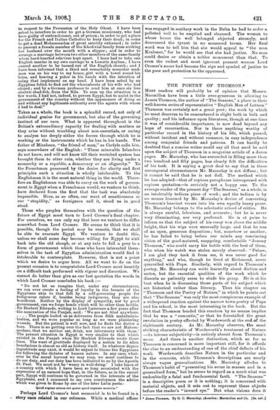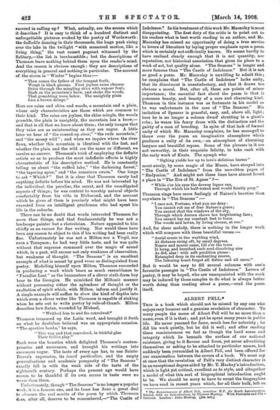THE POETRY OF THOMSON.*
MOST readers will probably be of opinion that Messrs. Macmillan have been a little over-generous in allowing to James Thomson, the author of "The Seasons," a place in their well-known series of representative "English Men of Letters." Thomson was certainly not a great poet ; the work by which he most deserves to be remembered is slight both in bulk and quality ; and his influence upon literature, though at one time it was of considerable importance, is now dead beyond any hope of resurrection. Nor is there anything worthy of particular record in the history of his life, which passed, without incident and without romance, in easy independence among congenial friends and patrons. It can hardly be doubted that a concise writer could say all that need be said upon the subject of Thomson in a magazine article of a dozen pages. Mr. Macaulay, who has succeeded in filling more than two hundred and fifty pages, has clearly felt the difficulties of his task. It is saying a great deal to say that in these uncongenial circumstances Mr. Macaulay is not diffuse ; but it cannot be said that be is not dull. The method which ho has adopted—that of copious paraphrase interspersed with copious quotation—is certainly not a happy one. To the average reader of the present day " The Seasons," as a whole, is an intolerably tedious piece of work ; and the tedium is by no means lessened by Mr. Macaulay's device of converting Thomson's heaviest verses into his own equally heavy prose. Mr. Macaulay belongs to the scholastic school of critics. He is always careful, laborious, and accurate ; but he is never very illuminating, nor very profound. He is at pains to inform us that the subject of his essay was above the middle height, that his wigs were unusually large, and that he was of an open, generous disposition ; but, somehow or another, he has failed to bring before our minds any convincing vision of the good-natured, easygoing, comfortable "Jemmy Thomson," who could carry his bottle with the best of them, who when his watch was stolen merely observed : " Pshaw, I am glad. they took it from me, it was never good for anything," and who, though he lived at Richmond, never quarrelled with Pope. Similarly, with regard to .Thomson's poetry, Mr. Macaulay can write learnedly about diction and metre, but the essential qualities of the work which he dissects so patiently seem to elude his grasp. He is at his best when he is discussing those parts of his subject which are historical rather than literary. Thus his chapter on "Thomson and the Poetry of Nature," in which he points out that "The Seasons" was only the most conspicuous example of a widespread reaction against the narrow town-poetry of Pope and his school, is the most interesting in the book. But the fact that Thomson headed this reaction by no means implies that he was a " romantic," or that he forestalled the great revolution in poetry effected by Wordsworth at the end of the eighteenth century. As Mr. Macaulay observes, the most striking characteristic of Wordsworth's treatment of Nature —its intense subjectivity—is entirely absent from Thomson's verse. And there is another distinction, which so far as Thomson is concerned is more important still, for it affords the clue to an understanding of one of the chief defects of his work. Wordsworth describes Nature in the particular and in the concrete, while Thomson's descriptions are nearly always vague generalisations. Mr. Macaulay alludes to Thomson's habit of "presenting his scene in masses and in a generalised'form," but he seems to regard as a merit what was undoubtedly a fatal' and fundamental fault. "The Seasons" is a descriptive poem or it is nothing; it is concerned with material objects, and it sets out to represent these objects before the reader's "inward eye." But what visions does it • Jams Thomson. By G. C. Macaulay. (London: Macmillan and Co. fee. net.]
succeed in veiling up P What, actually, are the scenes which it describes P It is easy to think of a hundred distinct and unforgettable pictures evoked by the poetry of Wordsworth : the daffodils dancing in their thousands, the huge peak rising over the lake in the twilight "with measured motion, like a living thing," the vast sunset pageant witnessed by the Solitary,—the list is inexhaustible ; but the descriptions of Thomson leave nothing behind them upon the reader's mind. And the reason is obvious enough : they are descriptions of everything in general and nothing in particular. The account of the storm in " Winter " begins thus :—
" Then comes the father of the tempest forth, Wrapt in black glooms. First joyless rains obscure Drive through the mingling skies with vapour foul; Dash on the mountain's brow, and shake the woods, That grumbling wave below. The unsightly plain Lies a brown deluge."
Here are rains and skies and woods, a mountain and a plain, whose only characteristics are those which are common to their kind. The rains are joyless, the skies mingle, the woods grumble, the plain is unsightly, the mountain has a brow,— and that is all that we know about them ; the only images that they raise are as uninteresting as they are vague. A little later we hear of "the roused-up river," "the rude mountain," and " the mossy wild "; and when we inquire where the river flows, whether this mountain is identical with the last, and whether the plain and the wild are the same or different, we receive no answer. Thomson's trick of employing the definite article so as to produce the most indefinite effects is highly characteristic of his descriptive method. He is constantly telling us about "the ruffled lake," "the darkening forest," "the tapering spire," and "the conscious swain." One longs to ask " Which ? " But it is clear that Thomson rarely bad anything definite before his mind. He was not interested by
the individual, the peculiar, the secret, and the unmitigated aspects of things ; he was content to worship natural objects
comfortably from his villa in Richmond, and the account which he gives of them is precisely what might have been
expected from an intelligent gentleman who had spent his life in the suburbs.
There can be no doubt that words interested Thomson far more than things, and that fundamentally he was not a landscape painter but a rhetorician. Nature appealed to him chiefly as an excuse for fine writing. Nor would there have been any reason to object to this if his writing had been really fine. Unfortunately he was not a Milton nor a Virgil, nor even a Tennyson ; he had very little taste, and he was quite without that supreme command over the magic of sound which, in a poet, will excuse not only weakness of observation, but weakness of thought. "The Seasons" is an excellent example of what is meant by good verse as distinguished from poetry. Modelling himself upon Milton, Thomson succeeded in producing a work which bears as much resemblance to "Paradise Lost" as the hexameters of a clever sixth-form boy bear to the Georgics. He mimicked the Miltonic manner
without possessing either the splendour of thought or the exaltation of spirit which, with Milton, inform and justify it. A single example will suffice to show the kind of depths into
which even a clever writer like Thomson is capable of sinking when he sets out to write poetry by rule-of-thumb. Milton describes how Satan, wounded by Michael, "Writhed him to and fro convolved."
Thomson treasured up the Latin word, and brought it forth
on what he doubtless believed was an appropriate occasion. "The sportive lambs," he says, "This way and that convolved, in friskful glee Their frolics play."
Such were the beauties which delighted Thomson's contem- poraries and successors, and brought his writings into enormous vogue. The taste of every age has, to use Sainte- Beuve's expression, its gcueil particulier, and the empty generalisations and academic pomposity of " The Seasons " exactly fell in with the weak side of the taste of the eighteenth century. Perhaps the present age would have reason to be thankful if its own errors in taste were no
worse than these.
Unfortunately, though " The Seasons" is no longer a popular work, it is a famous one, and its fame has done a great deal to obscure the real merits of the poem by which Thomson
dces, after all, deserve to be remembered,—" The Castle of Ludolence.1 In his treatment of this work Mr. Macaulay is most disappointing. The first duty of the critic is to point out to
his readers what is best worth reading in an author, and. Mr. Macaulay has missed an opportunity of doing a true service to lovers of literature by laying proper emphasis upon a poem.
which is certainly not sufficiently known. He seems hardly to- have realised clearly enough that it is not quantity, nor
reputation, nor historical association that gives its place to a work of art, but quality alone. "The Seasons" is longer and.
more famous than " The Castle of Indolence." But it is not. so good a poem. Mr. Macaulay is unwilling to admit this ;, he complains that " The Castle of Indolence" lacks unity,. that its cl,enoilment is unsatisfactory, and that it draws too obvious a moral. But, after all, these are points of minor
importance; the essential fact about the poem is that it possesses beauty, and beauty of a rare and charming kind.
Thomson in this instance was as fortunate in his model as he was unfortunate in the case of " The Seasons." His imitation of Spenser is graceful, easy, and, above all, light; here he is no longer a solemn dwarf strutting in a giant's robe ; he wears his fancy dress with the distinction and the gaiety of a man of breeding. In spite of that lack of formal unity of which Mr. Macaulay complains, he has managed to throw over the poem an imaginative atmosphere which produces a unity of its own,—an atmosphere of eharming languor and beautiful repose. Some of the phrases in it are not unworthy, in their exquisite felicity, to take rank with the early work of Keats. The nymph who "Sighing yields her up to love's delicious harms " must surely, by some magic of the Muses, have strayed into " The Castle of Indolence" from the unwritten pages of " Endymion." And might not these lines have almost found a place in " The Eve of St. Agnes " ?-
" While o'er his eyes the drowsy liquor ran,
Through which his half-waked soul would faintly peep."
Thomson sings here more feelingly of Nature's beauties than anywhere in " The Seasons " " I care not, Fortune, what you me deny :
You cannot rob me of free Nature's grace; You cannot shut the windows of the sky, Through which Aurora shows her brightening face ; You cannot bar my constant feet to trace The woods and lawns, by living stream, at eve."
And, for sheer melody, there is nothing in the longer work which will compare with these beautiful verses :— "Aerial music in the warbling wind,
At distance rising oft, by small degrees, Nearer and nearer came, till o'er the trees It hung, and breathed such soul-dissolving airs As did, alas ! with soft perdition please : Entangled deep in its enchanting snares, The listening heart forgot all duties and all cares."
But it would be easy to fill several columns with one's: favourite passages in "The Castle of Indolence." Lovers of
poetry, it may be hoped, who are unacquainted with the work may be induced by these samples to do what is always better worth doing than reading about a poem,—read the poem. itself.











































 Previous page
Previous page